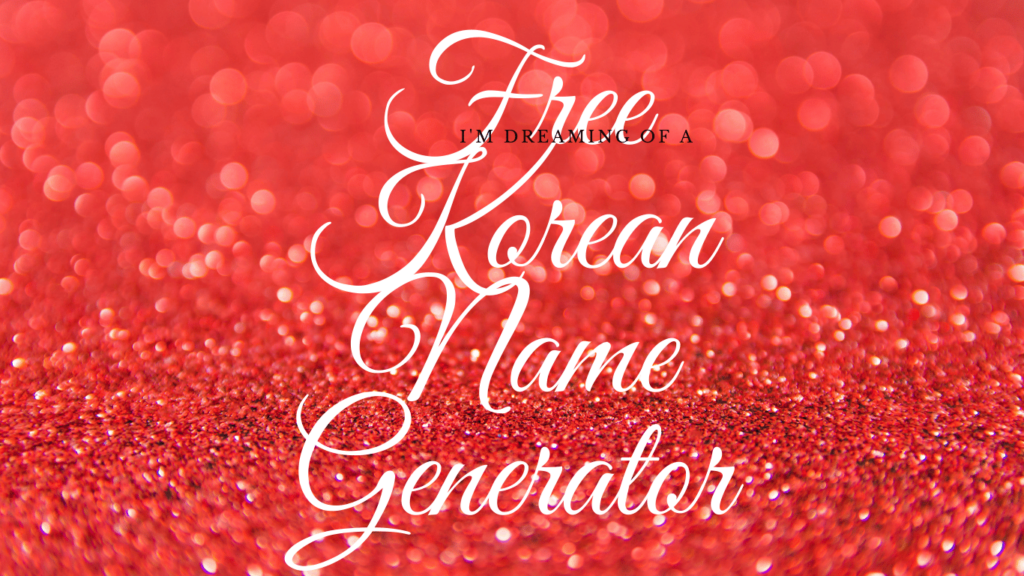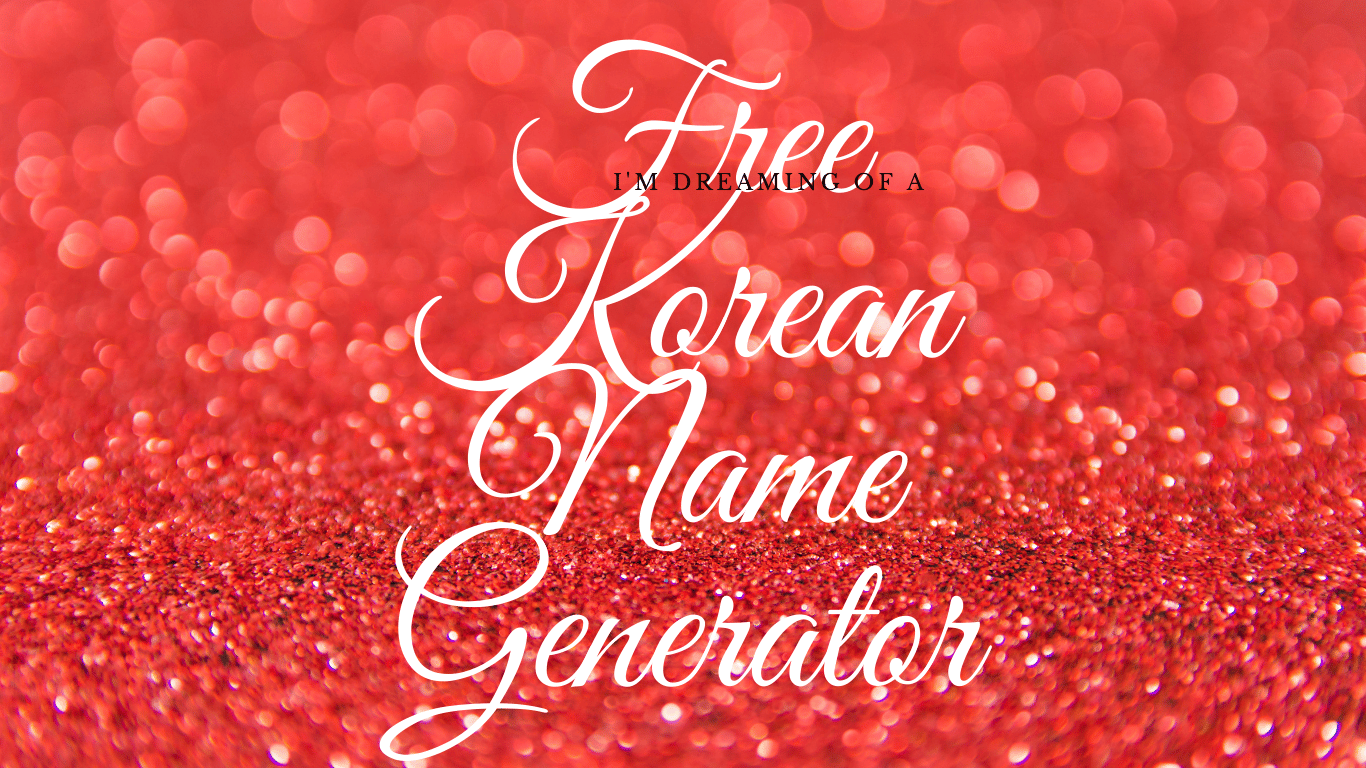Korean Name Generator
The Ultimate Guide to Free Korean Name Generators: Finding Your Perfect Korean Name
In recent years, there has been a remarkable surge in global interest in Korean culture, largely driven by the phenomenal success of K-pop groups like BTS and BLACKPINK, captivating K-dramas such as “Squid Game” and “Extraordinary Attorney Woo,” and the growing appreciation for Korean cuisine and skincare.

This Korean Wave, or “Hallyu,” has naturally extended to an interest in Korean names and their meanings. Whether you’re creating characters for a story set in Korea, choosing an online persona for gaming, learning the Korean language, or simply curious about what your name might be in Korean, free Korean name generators have become invaluable tools. This comprehensive guide explores everything you need to know about these digital naming assistants.
Korean Name Structure and Meaning
Understanding Korean names requires familiarity with their unique structure and cultural significance. Unlike Western naming conventions, Korean names traditionally follow a specific pattern: a single-syllable family name followed by a two-syllable given name.
Family Names in Korean Culture
Korean family names are remarkably condensed compared to many other cultures. While there are theoretically hundreds of family names in Korea, about 20 surnames account for approximately 90% of the population’s last names. The three most common surnames are:
| Family Name | Approximate Percentage of Population | Meaning |
|---|---|---|
| Kim (김) | 20% | Gold |
| Lee/Yi (이/리) | 15% | Plum tree |
| Park/Pak (박) | 8% | Gourd |
Other common surnames include Choi, Jung, Kang, Cho, Yoon, Jang, and Lim. This concentration of surnames stems from historical clan systems in traditional Korean society.
Given Names and Their Significance
Korean given names typically consist of two syllables, though single-syllable names exist. These names are chosen with extraordinary care, as they’re believed to influence a person’s destiny. Parents often consult naming specialists or use generational naming systems within families.
Korean given names are written using Hanja (Chinese characters used in Korean writing) or created using pure Korean words (though this is less common). Each syllable carries specific meanings, often reflecting virtues, natural elements, or aspirations for the child. For example:
- Min (민): intelligence, cleverness
- Soo (수): outstanding, excellent
- Hye (혜): wisdom, bright
- Jun (준): talented, handsome
- Ji (지): wisdom, knowledge
Top 10 Free Korean Name Generators
For those seeking to explore Korean names without deep linguistic knowledge, several online tools can help. Here’s an in-depth look at the top free Korean name generators:
1. Behind the Name: Korean Names
URL: behindthename.com/random/random.php?number=1&gender=both&surname=&usage_kor=1
This generator draws from an extensive database of authentic Korean names with detailed meanings. It allows users to specify gender and can generate both given names and surnames.
Key Features:
- Authentic names with historical context
- Detailed meanings and pronunciation guides
- Option to generate multiple names at once
- Ability to save favorite names
User Experience: Clean interface with minimal ads and easy navigation.
2. Fantasy Name Generators: Korean Names
URL: fantasynamegenerators.com/korean_names.php
One of the most comprehensive name generators available, offering separate sections for modern and traditional Korean names.
Key Features:
- Gender-specific name generation
- Modern and historical name options
- Names presented in both Hangul and romanized form
- Brief explanations of meanings
User Experience: Simple design with multiple generation options, though some users report occasional ads.
3. RNG: Korean Name Generator
URL: reedsy.com/random-name-generator/korean
Particularly suitable for writers, this generator provides character-focused Korean names with personality traits.
Key Features:
- Names accompanied by character traits
- Gender and age filters
- Family name options
- Name meaning explanations
User Experience: Clean, writer-friendly interface with minimal distractions.
4. 20000-Names: Korean Names
URL: 20000-names.com/korean_names.htm
A straightforward database of Korean names organized alphabetically with meanings.
Key Features:
- Extensive alphabetical listing
- Detailed etymological information
- Historical context for names
- Pronunciation guides
User Experience: Basic interface but rich information content.
5. Name Generator Fun: Korean Names
URL: namegeneratorfun.com/korean
Offers both traditional and modern Korean name options with customizable parameters.
Key Features:
- Toggles for traditional/modern names
- Gender selection options
- Multiple name generation at once
- Social sharing capabilities
User Experience: User-friendly interface with quick generation times.
6. K-Names: Korean Name Generator
URL: k-names.net
Specifically focused on authentic Korean names with cultural context.
Key Features:
- Names verified by native Korean speakers
- Cultural explanations for name choices
- Hanja character references
- Common nicknames associated with names
User Experience: Korean-focused interface with detailed cultural information.
7. NameSherpa: Korean Name Generator
URL: namesherpa.com/korean-name-generator
Offers personalized Korean name suggestions based on your birth name.
Key Features:
- Name matching based on sound similarity
- Cultural appropriateness filter
- Meaning prioritization
- Pronunciation audio guides
User Experience: Interactive interface requiring user input for personalization.
8. Korean Class 101: Name Generator
URL: koreanclass101.com/korean-names
Educational tool that explains Korean naming conventions alongside generation.
Key Features:
- Educational components about Korean culture
- Audio pronunciation by native speakers
- Hangul, romanization, and Hanja versions
- Gender-specific options
User Experience: Learning-focused interface with educational supplementary content.
9. Sleepy Time Name Generator: Korean Names
URL: sleepytimenamegenerator.com/korean
Simplistic but effective generator focusing on ease of use.
Key Features:
- One-click generation
- Simple interface
- Gender toggles
- Multiple name suggestions at once
User Experience: Minimalist design ideal for quick generation.
10. Multicultural Name Generator
URL: diversity.social/korean-name-generator
Focuses on cultural authenticity and appropriateness.
Key Features:
- Cultural context explanations
- Regional name variations
- Historical significance notes
- Appropriateness guidelines
User Experience: Educational interface with cultural sensitivity focus.
How to Choose an Authentic Korean Name
Selecting an appropriate Korean name involves more than random generation. Consider these guidelines:
- Understand Gender Distinctions: Korean names often have gender-specific elements. Syllables like “Min,” “Jin,” and “Joon” are commonly used in male names, while “Hye,” “Min,” and “Ji” are frequently found in female names (note that some syllables like “Min” can be used for both genders).
- Consider Syllable Harmony: Traditional Korean names follow harmonic principles. The syllables should flow well together and create balance.
- Research Meanings: Each syllable in Korean names carries specific meanings. Research these to ensure your chosen name conveys the qualities or characteristics you wish to express.
- Avoid Inadvertent Humor or Offense: Some combinations that sound fine to non-Korean ears might create unintentional humor or inappropriate connotations in Korean. Verify your chosen name with a Korean speaker if possible.
- Respect Traditional Structure: Maintain the typical structure of a one-syllable surname followed by a two-syllable given name.
Uses for Korean Name Generators
Korean name generators serve various purposes:

Creative Writing and Character Development
Writers creating Korean characters benefit from authentic-sounding names that reflect their characters’ personalities and backgrounds. Name generators provide quick access to culturally appropriate options.
Gaming and Online Personas
Gamers and online users often adopt Korean names for their digital personas, particularly in games with strong Korean player bases or those inspired by Korean culture.
Language Learning Applications
Korean language learners sometimes adopt Korean names as part of their immersive learning experience, helping them connect more deeply with the culture.
Cultural Exploration
Those interested in Korean culture may use name generators to understand naming conventions and appreciate the significance of names in Korean society.
Korean Name Trends
Korean naming trends have evolved significantly over generations:
Traditional Era (Pre-1950s)
Traditional Korean names were heavily influenced by Confucian values and often included virtuous qualities like loyalty, filial piety, and respect. Male names frequently contained syllables representing strength and achievement, while female names emphasized beauty and gentleness.
Modernization Period (1950s-1990s)
During Korea’s rapid modernization, naming practices began to shift. Parents started choosing names with aspirational meanings related to success, prosperity, and global outlook. This period saw the rise of names containing syllables like “Min” (intelligence), “Joon” (talented), and “Seo” (auspicious).
Contemporary Era (2000s-Present)
Modern Korean parents often choose names that are:
- Easier to pronounce internationally
- Gender-neutral (increasingly popular)
- Distinctive rather than traditional
- Based on positive meanings rather than traditional virtues
graph LR
A[2015] -->|+20%| B[2017]
B -->|+45%| C[2019]
C -->|+85%| D[2021]
D -->|+120%| E[2023]
E -->|+150%| F[2025]
style A fill:#d4e6f1,stroke:#2874a6
style B fill:#a9cce3,stroke:#2874a6
style C fill:#7fb3d5,stroke:#2874a6
style D fill:#5499c7,stroke:#2874a6
style E fill:#2980b9,stroke:#2874a6
style F fill:#1b4f72,stroke:#2874a6
The most popular Korean given names in recent years include:
| Rank | Male Names | Female Names |
|---|---|---|
| 1 | Do-yoon (도윤) | Seo-yoon (서윤) |
| 2 | Seo-jun (서준) | Ji-woo (지우) |
| 3 | Si-woo (시우) | Seo-ah (서아) |
| 4 | Ha-jun (하준) | Ha-eun (하은) |
| 5 | Ji-ho (지호) | Yoon-seo (윤서) |
| 6 | Joon-ho (준호) | Eun-seo (은서) |
| 7 | Eun-woo (은우) | Ji-a (지아) |
| 8 | Joon-seo (준서) | Min-seo (민서) |
| 9 | Min-jun (민준) | Soo-ah (수아) |
| 10 | Do-hyun (도현) | Ye-rin (예린) |
Cultural Appropriation Considerations
When using Korean name generators, it’s important to approach the process with cultural respect and awareness:
Appropriate Uses
- Character creation for fiction
- Language learning contexts
- Personal interest and education
- Gaming personas (with respect)
Considerations
- Avoid using Korean names to mock or stereotype
- Understand the cultural significance behind names
- Be open to correction from Korean individuals
- Recognize that names carry personal and cultural meaning
Comparison of Free vs. Paid Korean Name Generators
While numerous free options exist, some paid generators offer additional features:
| Feature | Free Generators | Paid Generators |
|---|---|---|
| Basic name generation | ✓ | ✓ |
| Name meanings | Limited | Comprehensive |
| Historical context | Minimal | Detailed |
| Pronunciation guides | Text-based | Audio by native speakers |
| Customization options | Basic filters | Advanced personality matching |
| Cultural appropriateness | Variable | Culturally vetted |
| Updates and accuracy | Irregular | Regular updates |
| Hanja character options | Limited | Comprehensive |
| Regional variations | Rarely included | Often included |
| Ad-free experience | No | Yes |
Technical Aspects of Korean Name Generators
Algorithm Design
Most Korean name generators use one of several approaches:
- Database Selection: Drawing from pre-populated lists of authentic Korean names
- Syllable Combination: Combining Korean syllables according to linguistic rules
- Transliteration Engines: Converting non-Korean names into Korean approximations
- AI-Based Generation: Using machine learning to create names following Korean patterns
Transliteration Challenges
Converting between Korean and English presents several technical challenges:
- Phonetic Differences: Korean contains sounds not present in English and vice versa
- Syllable Structure: Korean syllables follow specific structural rules
- Hangul Complexity: The Korean writing system represents sounds differently than the Roman alphabet
- Regional Variations: Different romanization systems exist (Revised Romanization, McCune-Reischauer, etc.)
flowchart TD
A[Start: Need Korean Name] --> B{Purpose?}
B -->|Character Creation| C[Research era & background]
B -->|Personal Use| D[Consider meaning & values]
B -->|Online Persona| E[Check appropriateness]
C --> F[Use era-appropriate generator]
D --> G[Select meaning-focused generator]
E --> H[Verify with native speaker if possible]
F --> I[Check name structure]
G --> I
H --> I
I --> J{Appropriate?}
J -->|Yes| K[Final name selection]
J -->|No| L[Modify or regenerate]
L --> I
style A fill:#d0e0e3,stroke:#0b5394
style B fill:#d0e0e3,stroke:#0b5394
style J fill:#d0e0e3,stroke:#0b5394
style K fill:#d5f5e3,stroke:#117a65
Conclusion
Free Korean name generators offer a fascinating gateway into Korean culture, providing tools for creative expression, language learning, and cultural appreciation. When used thoughtfully and respectfully, these generators can help bridge cultural divides and foster greater understanding of Korean naming traditions and their significance.
Whether you’re a writer crafting authentic Korean characters, a language enthusiast exploring Korean culture, or simply curious about what your name might be in Korean, these generators provide valuable resources. The key to using them effectively lies in approaching them with cultural respect, understanding the structure and significance of Korean names, and recognizing the importance of names as carriers of cultural heritage.

As global interest in Korean culture continues to flourish, these digital tools will likely become increasingly sophisticated, offering even greater authenticity and educational value.
By embracing both the technological convenience of name generators and the cultural depth they represent, users can engage meaningfully with an important aspect of Korean heritage.

Leave a Reply